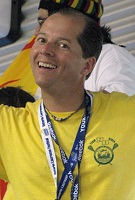
![]() Coach’s Full name: Dave Higdon
Coach’s Full name: Dave Higdon
Province: New Brunswick
Sport(s): Lacrosse
Coaching role: National-level coach women’s box lacrosse. President, Lacrosse New Brunswick
NCCP Status: Community Sport and Competition – Introduction certified coach; Learning Facilitator and Evaluator for Competition – Introduction
What is your greatest coaching moment/achievement?
My greatest moment throughout my 30 year coaching career was achieved when, with 1 minute and 27 seconds left at the 2009 Girls Bantam National Championships, I realized that my girls were actually going to leave with a medal. A bronze medal, none the less, but most importantly, our team was the underdog and all the parents had travelled all the way to Ontario to watch their girls play. Dedication and hard work from the team and their supporters had brought us up all the way to this great moment.
What are three things you think every coach should know?
- Get to know your athletes and what motivates each and every one of them. Listening to your athletes is a must.
- You have to coach for the RIGHT reasons.
- Always remember that you’re coaching a person, a human being, and not only an athlete. It’s important to realize that you have a long-term impact on your athletes; you’re molding and building them as people.
Why did you decide to become a coach?
I decided to become a coach on my way back home from playing lacrosse in Newfoundland (I’ve played many other sports, but lacrosse was the most important for me). A friend of mine asked me: “What will you do for the next four years Dave?” That’s when I realized that I wanted to stay in the lacrosse world, and coaching was the perfect way to get back into that world. Lacrosse had changed me as a person, and so I wanted to change the direction of other kids’ lives too. Kids have choices to make in life, and sports help kids stay off the streets, by hitting the gym. By giving kids this opportunity, you give them the possibility to build better lives.
How would your athletes describe your coaching style?
Emotional. I’m the type of coach who reaches the kids not only by teaching them technical skills, but by giving them the motivation they need to want to excel and push their limits. I want them to realize that they all have different capacities that they can use to play the best they can.
Your coaching takes up how much time and effort?
Coaching takes up a lot of hours in my week, considering the fact that I have kids to take care of as well as a full-time job. During the season (mid-November to August) it’s around 15 hours a week, including preparation, practices, games, and championships. It’s like a part-time job on the side. Also, since lacrosse in New Brunswick is very small compared to other provinces, we do a lot of management on top of our coaching hours. Our provincial lacrosse team is made up of a lot of great people and friends, so even if it’s a lot of work, it’s also a lot of fun.
What is the most important thing you learned as part of your NCCP training?
Other than taking coaching to a serious level, my NCCP training taught me one of the most important aspects of coaching -- planning. When I was a house league coach, I would show up with nothing other than my creative and innovative skills to lead my practices. With my NCCP training, I learned that planning is crucial to helping your kids evolve throughout a season. Also, having something you can show to your kids and their parents also help them understand what you are doing as a coach.
Why is being a coach the best job in the world?
Nothing beats how you feel when you are on the bench -- you feel alive. If I could do my life over again, I would become a professional coach. You are changing the lives of kids, in a positive way. You’re helping them grow physically and emotionally. Seeing one of your kids trying to learn how to throw a ball and seeing them grow into adults is wonderful. There simply cannot be a better job in the world.
A touching story …
Being a Learning Facilitator for lacrosse, I hear great life changing stories from coaches. One ex-lacrosse athlete that attended my course blames lacrosse for keeping him on the correct path in life. Instead of hitting the streets (he had a hard upbringing), he hit the gym, where he learned good values and respect from the sport he was playing. He is now a police officer, coach, parent, mentor, and advisor for kids. To hear this, makes my job seem even more rewarding.